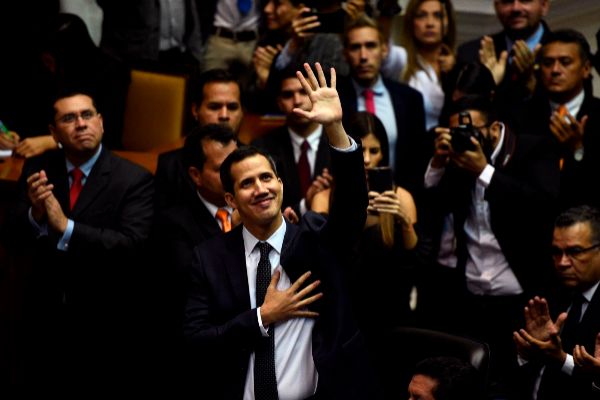- Venezuela: Chavismo deepens its attacks against Josep Borrell
- Venezuela.United Nations claims the release of the last incarcerated deputy
"I respectfully urge the international community and multilateral organizations to pay special attention to Venezuela during this important day." The Venezuelan Parliament, the only power in the country that has not fallen into the hands of Chavismo , plays its future on Sunday with a session in which everything can happen, unpublished milestone only possible in revolution.
The opposition starts with 93 deputies, who supported democratic unity at the end of last year in the hemicycle. Juan Guaidó, who has alerted the world with the phrase that opens this chronicle, needs at least a quorum of 84 parliamentarians to start the session where he should obtain the re-election agreed between a score of opposition parties.
In another country in the world the accounts would be clear . Not in Venezuela "Coercive measures" against the deputies put in place by the Government of Nicolás Maduro to distort the popular will include the illegalization of political parties (the four main ones plus the Democratic Unit itself), the violation of the National Assembly site , the bribe to parliamentarians, persecution, imputation of unfounded crimes, violation of parliamentary immunity and execution of arbitrary detentions that have forced them into hiding, refuge and exile, according to the communiqué made public by the interim Government of Guaidó.
All this has multiplied in recent days, including the imprisonment of Deputy Gilber Caro, one less vote, and the arrest warrants against a dozen assembly members. The scope of Operation Alacrán (purchase of wills through Boliburgian millionaires, enriched by its proximity to the Bolivarian power and at the expense of an impoverished country) is unknown, beyond another dozen designated deputies and even under investigation. From door to outside, the team of Juan Guaidó and the parties that support him ensure that they get the bills , although nervousness spreads with the passing of the hours.
Different leaders have turned in recent days to assist the deputies who travel from within the country to Caracas, until they get the majority to spend the night in the Creole capital last night. A joint strategy has also been deployed to access the Legislative Palace today . The deputies fear that they will make it difficult for them to enter the National Assembly, which is already traditional, and that the radicals of the Government will once again take the surroundings of Parliament with their violence.
It is also unknown what will be the attitude of the 50 revolutionary deputies who have returned to the National Assembly by order of Maduro , uncertainty that extends to radical opponents, deputies affected by bribes and those close to the Miraflores Palace, such as Timoteo Zambrano, the man of confidence of the former president of the Spanish Government José Luis Rodríguez Zapatero in Caracas.
The initial objective of the opposition is to obtain the necessary quorum with the presence in situ of the deputies, but the operation goes beyond Caracas. The opposition has arranged at least two voting commands abroad for thirty exiled deputies. Refugees parliamentarians in the region will concentrate in Bogotá, from where they will continue the session and try to connect via Skype. Those in Europe have chosen a Madrid hotel to support Guaidó and consolidate the vote. These supports are possible thanks to the reform of the regulation that allows the telematic vote, approved in the National Assembly but that the Supreme Court of Justice (TSJ) of Maduro has decreed "void of any nullity".
In Madrid there are already Mariela Magallanes and Américo de Grazia, two deputies from La Causa R exiled in Italy after staying refugees at the Embassy of the Italian country in Caracas. Six other deputy parliamentarians will accompany you this Sunday during the full "long distance". "God wants the National Assembly not to be lost," said Jesuit José Virtuoso, rector of the Andrés Bello Catholic University.
The Catholic clergy, the most respected institution in the country according to the latest polls, has opted for the permanence of Guaidó in front of the Parliament and the presidency in charge.
" I have never considered that Juan Guaidó has easy his re-election , it depends on many circumstances. The Government is determined to remove deputies by clearing immunities or with detentions. It can obstruct their passage through the cities where they are, even the government can try to prevent satellite vote. It is an internal election besieged by the government and some opposition sectors, "summarizes the political scientist Luis Salamanca, former rector of the CNE.
Beyond the outcome of the parliamentary session, Maduro's roadmap goes through advancing legislative elections to whatever way, either through the TSJ or the Constituent Assembly, the Bolivarian force-imposed body that has appropriated The functions of Parliament. Opposition groups negotiating with the government are already preparing for these elections , which they intend to reach with a reformed National Electoral Council (CNE) after failing with their promise that their government allies would release political prisoners at Christmas.
According to the criteria of The Trust Project
Know more- Juan Guaidó
- Venezuela
- Supreme Court
- José Luis Rodríguez Zapatero
- Venezuela Elections
Venezuela The Supreme Court of Nicolás Maduro declares the virtual vote of the deputies in exile void
Venezuela Juan Guaidó rescues a deputy besieged by military counterintelligence
Venezuela The opposition changes the rules of the Assembly so that exiled deputies can vote

